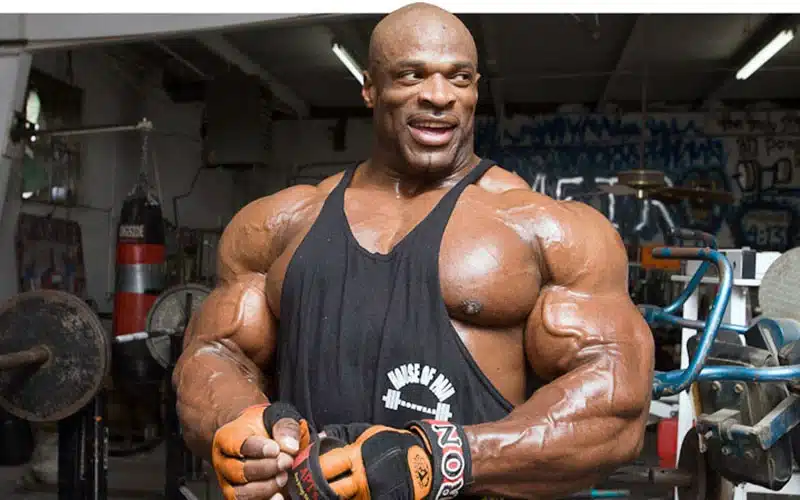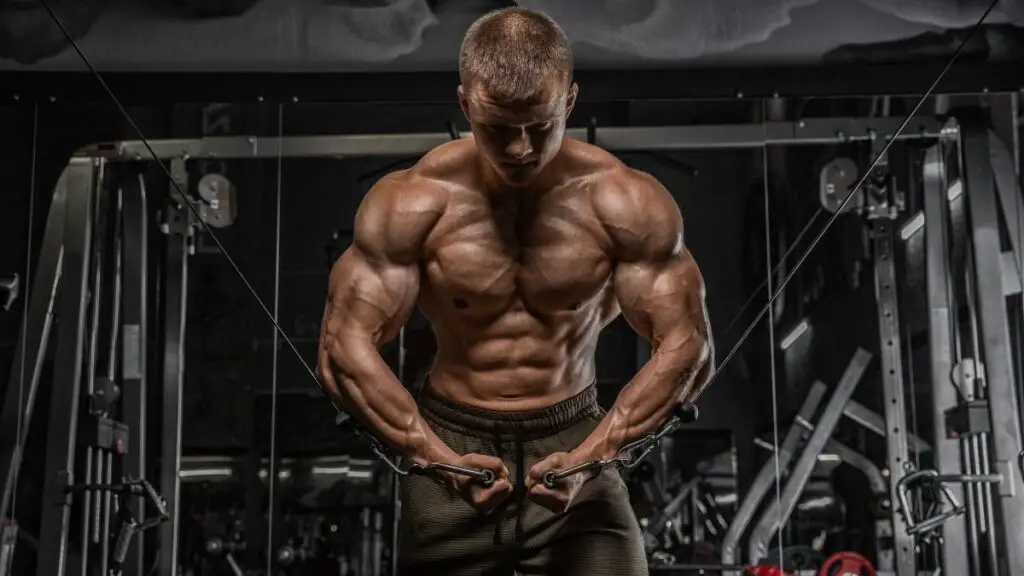Introduction
How Much Do Bodybuilders Weigh: Bodybuilding is not just about bulking up to colossal proportions; it’s an intricate dance between muscle mass, aesthetics, and overall health. The weight of a bodybuilder can vary dramatically depending on various factors, including their height, body composition, training regimen, and competitive goals. Understanding the weight of bodybuilders requires delving into the nuances of their sport.
One of the key elements in bodybuilding is achieving the perfect balance between muscle mass and body fat percentage. Bodybuilders work tirelessly to build lean muscle mass while simultaneously reducing body fat to showcase their chiseled physiques. This process, known as “cutting,” often involves rigorous dieting and training regimens, further complicating the question of how much they weigh. Bodybuilders typically undergo different phases throughout the year. They may go through a bulking phase, during which they aim to increase muscle size and strength by consuming a surplus of calories, followed by a cutting phase to shed excess body fat and reveal their hard-earned muscle definition. This cycle of gaining and losing weight is part of their competitive strategy and impacts their overall weight.
Moreover, bodybuilders come in all shapes and sizes. Some compete in weight classes, which means that they must adhere to strict weight limits to compete on a level playing field. Others prioritize aesthetics and muscle symmetry over a specific weight target. Consequently, the weight of a bodybuilder can range from as low as 150 pounds to well over 300 pounds, depending on their individual goals and the category in which they compete.

How much do bodybuilders weigh kg?
The lean body weight and percent fats of the subjects were: body builders = 74.6 kg, 9.3%; power weight lifters = 73.3 kg, 9.1%; and Olympic weight lifters = 68.2 kg, 10.8%. No group differences were present in frame size, percent fat, lean body weight, skinfolds, and diameter measurements.
Lightweight: Bodybuilders in this category usually weigh up to 70 kilograms (154 pounds) or less. They focus on achieving a lean and aesthetic physique.
Middleweight: Middleweight bodybuilders typically weigh between 70 kilograms (154 pounds) and 80 kilograms (176 pounds). They aim for a balanced combination of muscle size and definition.
Light-Heavyweight: This category encompasses bodybuilders who weigh between 80 kilograms (176 pounds) and 90 kilograms (198 pounds). They prioritize muscle size and symmetry.
Heavyweight: Heavyweight bodybuilders are those who weigh over 90 kilograms (198 pounds). They focus on building substantial muscle mass and strength.
Super Heavyweight: Some competitions have a super heavyweight category for bodybuilders who exceed a certain weight limit, often around 100 kilograms (220 pounds) or more.
How much should you weigh as a bodybuilder?
Ideal Weight to Height
Weight to height charts let you know inch by inch what your ideal weight should be as a male bodybuilder. The amount of weight increases by five to 10 pounds per inch. If you’re 5 feet, 5 inches, then your ideal weight is 160 pounds. If you’re 5 feet, 6 inches it is 165 pounds.
Genetics
Genetics play a crucial role in determining how much muscle an individual can naturally carry and how their body responds to training and nutrition. Some people have a genetic predisposition to build muscle more easily, while others may find it more challenging to put on size. Therefore, a bodybuilder’s ideal weight can vary greatly based on their genetic makeup.
Competition Category
For competitive bodybuilders, the ideal weight is often dictated by the competition category they wish to enter. Different bodybuilding organizations have various weight classes, such as lightweight, middleweight, light-heavyweight, heavyweight, and super heavyweight. Bodybuilders must adhere to these weight limits to compete in their chosen category.
Body Composition
Body composition, which refers to the ratio of muscle to fat in the body, is another crucial consideration. Many bodybuilders focus on reducing body fat levels to achieve the desired aesthetic look. This can result in a lower overall weight, even if they have significant muscle mass. The concept of “cutting” involves shedding excess body fat while preserving muscle mass, which can lead to a lighter weight on the scale.
Health and Functionality
While aesthetics are a primary concern for bodybuilders, it’s essential to consider overall health and functionality. Carrying an excessive amount of muscle or body fat can have negative implications for health. Therefore, the ideal weight should align with a bodybuilder’s overall well-being.
How much should a 6 2 bodybuilder weigh?
A bodybuilder at 6’2″ might weigh between 220 and 250 pounds with low body fat, while an athlete with a more balanced body composition might weigh between 180 and 210 pounds.
Genetics: Genetics play a substantial role in determining how much muscle an individual can naturally carry and how their body responds to training and nutrition. Some individuals have a genetic predisposition to build muscle more easily, while others may find it more challenging. Therefore, genetics can influence the ideal weight for a 6’2″ bodybuilder.
Competition Category: For competitive bodybuilders, the ideal weight is often determined by the competition category they intend to enter. Different bodybuilding organizations have various weight classes, such as lightweight, middleweight, light-heavyweight, heavyweight, and super heavyweight. To compete in a specific category, bodybuilders must adhere to the prescribed weight limits.
Body Composition: Body composition, which refers to the ratio of muscle to fat in the body, is another critical consideration. Many bodybuilders engage in a process called “cutting” to reduce body fat while preserving muscle mass, which can lead to a lighter weight on the scale. Achieving the desired body composition is often more than the number on the scale.
Health and Functionality: While aesthetics are a primary concern for bodybuilders, it’s crucial to consider overall health and functionality. Carrying an excessive amount of muscle or body fat can have negative health implications. Therefore, the ideal weight should align with a bodybuilder’s overall well-being.
Is 90kg heavy for a man?
Yes you are overweight. Your ideal weight should be between 65-70 kgs. Your weight is controlled by 4 major factors (1) refined sugar consumption (2) exercise and hydration (3) posture and sitting (4) how many times do you indulge yourself – alcohol, binge eating at parties, overeating etc.
Height Plays a Role
Height is another vital factor in determining whether 90 kilograms is heavy for a man. What might be considered heavy for a man of average height could be entirely normal for a taller individual. Body mass index (BMI), a commonly used measure for assessing weight in relation to height, can provide some guidance. However, it’s essential to BMI has limitations and does not account for factors like muscle mass and body fat percentage.
Fitness and Health
Weight alone does not provide insight into a person’s overall health and fitness. A man who weighs 90 kilograms but regularly exercises, eats a balanced diet, and maintains good cardiovascular health may be perfectly healthy and fit. On the other hand, someone who weighs less but has a sedentary lifestyle, poor nutrition habits, and underlying health issues may be less healthy.
Health Risks
Excessive weight, regardless of a person’s gender, can be associated with certain health risks. These risks include a higher likelihood of developing conditions like heart disease, diabetes, high blood pressure, and joint problems. However, the degree of risk depends on multiple factors, including genetics and lifestyle choices.
Is 70kg light for a man?
BMI score of 22.86 for 70 kg weight and 175 cm height shows that your weight is Normal, according to the BMI chart and classification.
Body Composition Matters
One of the most crucial factors to consider when evaluating whether 70 kilograms is light for a man is body composition. Weight alone does not distinguish between muscle, bone, and fat. A man who weighs 70 kilograms with a higher percentage of muscle mass may not be considered light, as muscle weighs more than fat and contributes to strength, athletic performance, and overall fitness.
Conversely, a man who weighs 70 kilograms but has a higher percentage of body fat may be considered overweight, particularly if the fat is concentrated around the abdomen. Body fat percentage and distribution can have a more significant impact on health and aesthetics than weight alone.
Height Plays a Role
A man’s height is another critical factor in determining whether 70 kilograms is light. What might be considered light for a taller man could be entirely normal or even heavy for someone of shorter stature. Body mass index (BMI), a commonly used measure for assessing weight in relation to height, can provide a rough guideline. However, it does not account for factors like muscle mass and body fat percentage, making it an imperfect measure.
Fitness and Health
Weight alone does not provide a complete picture of a man’s overall health and fitness. A man who weighs 70 kilograms but maintains a regular exercise regimen, consumes a balanced diet, and has good cardiovascular health may be considered healthy and fit. Conversely, an individual who weighs less but leads a sedentary lifestyle, has poor nutrition habits, or underlying health issues may not be as healthy.
Who is the heaviest bodybuilder?
Without a doubt, the title of biggest bodybuilder on this list goes to Greg Kovacs. This monster of a man didn’t just have an insane amount of mass – he was also very tall.
Ronnie Coleman – “Big Ron”:
One name that stands out when discussing heavyweight bodybuilders is Ronnie Coleman. Hailing from the United States, Coleman is widely regarded as one of the most successful and massive bodybuilders of all time. He stood 5 feet 11 inches (180 cm) tall and at the peak of his career, his off-season weight was rumored to be around 150 kilograms (330 pounds).
Ronnie Coleman achieved a record eight consecutive Mr. Olympia titles from 1998 to 2005. His enormous size and unparalleled muscle mass made him an icon in the bodybuilding world.
Paul Dillet – “The Big Sexy”:
Paul Dillet, a Canadian bodybuilder, earned the nickname “The Big Sexy” due to his remarkable size and presence on the stage. Standing at 6 feet 2 inches (188 cm) tall, Dillet weighed in at around 280 pounds (127 kilograms) during his prime.
Dillet’s career was marked by his massive shoulders, chest, and overall impressive muscularity. He competed in various bodybuilding competitions, including the Mr. Olympia, and left a lasting impression with his exceptional size.
Marcus Ruhl – “The German Giant”:
Marcus Ruhl, a German bodybuilder, is known for his colossal size and towering physique. Standing at 6 feet 2 inches (188 cm), Ruhl’s competitive weight ranged from 130 kilograms (286 pounds) to even heavier during his career.
Ruhl’s career was characterized by his huge legs and impressive mass, which earned him the nickname “The German Giant.” He competed in several bodybuilding events and became a fan favorite for his larger-than-life presence on the stage.
How tall is a 90 kg bodybuilder?
And, in fact, in amateur contests, typically about 2/3rds of the competitors are under 198 lbs. (90 kg) and, therefore, usually under 5’8″.
Body Composition Matters
One of the primary factors affecting the height of a 90 kg bodybuilder is their body composition. Muscle is denser and weighs more than fat. Therefore, a bodybuilder who has a higher percentage of muscle mass will likely have a more compact physique and may not appear as tall, even though they weigh 90 kg.
Genetics Play a Role
Genetics are a critical factor in determining an individual’s height and how their body carries weight. Some people naturally have a taller frame and can carry 90 kg without appearing overly bulky, while others may have a shorter stature and appear more massive at the same weight.
Muscle Mass vs. Body Fat
A bodybuilder’s weight of 90 kg can be comprised of different proportions of muscle mass and body fat. Bodybuilders who prioritize muscle growth while minimizing body fat may have a more muscular appearance but may not necessarily be taller. Conversely, those with a higher body fat percentage might have a softer physique but not necessarily appear shorter.
Individual Goals
The goals of a bodybuilder play a significant role in how they appear at a given weight. Some bodybuilders aim for maximum muscle mass and strength, which can lead to a more compact and muscular look. Others focus on achieving a lean and aesthetic physique, which may result in a leaner appearance.
Do bodybuilders lift heavy weight?
Bodybuilding workouts build the most muscle
Bodybuilding training using medium-to-heavy weights for 8–12 repetitions and multiple sets per muscle group is the best method to build muscle mass ( 4 ).
Progressive Overload
Lifting heavy weights is a cornerstone of bodybuilding because of the principle of progressive overload. This principle states that in order to build muscle, you must continually increase the demands placed on your muscles. Lifting heavier weights over time challenges the muscles and forces them to adapt, leading to muscle growth.
Hypertrophy
Bodybuilders primarily focus on muscle hypertrophy, which is the process of increasing the size of muscle fibers. Lifting heavy weights with proper form and technique is an effective way to induce muscle hypertrophy. Heavy resistance leads to microtears in muscle fibers, and during the recovery process, the body repairs and grows these fibers, making them larger and stronger.
Strength Development
Bodybuilders aim not only for muscle size but also for increased strength. Lifting heavy weights is instrumental in developing strength as it recruits more muscle fibers, improves neuromuscular coordination, and enhances the body’s ability to generate force.
Compound Movements
Many bodybuilders incorporate compound movements into their training routines. These exercises, such as squats, deadlifts, bench presses, and overhead presses, involve multiple muscle groups and require lifting heavy weights. Compound movements are efficient in stimulating overall muscle growth and functional strength.

Conclusion
Bodybuilders are not defined solely by the number on a scale but by their dedication, perseverance, and unwavering commitment to their craft. They are artists who chisel their bodies, working meticulously to balance muscle mass and body fat. Their weight can fluctuate significantly throughout the year as they transition between bulking and cutting phases, emphasizing the dynamic nature of their sport.
Bodybuilders come in a diverse range of sizes and shapes, with some competing in specific weight classes, while others prioritize aesthetics and muscle symmetry. This diversity highlights the adaptability of bodybuilding as a sport, accommodating a wide range of goals and body types.
In the world of bodybuilding, achieving and maintaining the ideal weight is a constant pursuit, often fraught with challenges. Strict dieting, grueling training regimens, and the pressure to meet specific weight goals all contribute to the complex nature of this endeavor. Yet, it is precisely these challenges that define the character of bodybuilders, pushing them to excel and reach their fullest potential. As we conclude our exploration, it is clear that bodybuilders are not just defined by their weight but by their relentless pursuit of excellence and their dedication to pushing the boundaries of human physicality. They inspire awe and admiration, not only for the numbers on a scale but for the passion and determination they exhibit on their remarkable journeys.

